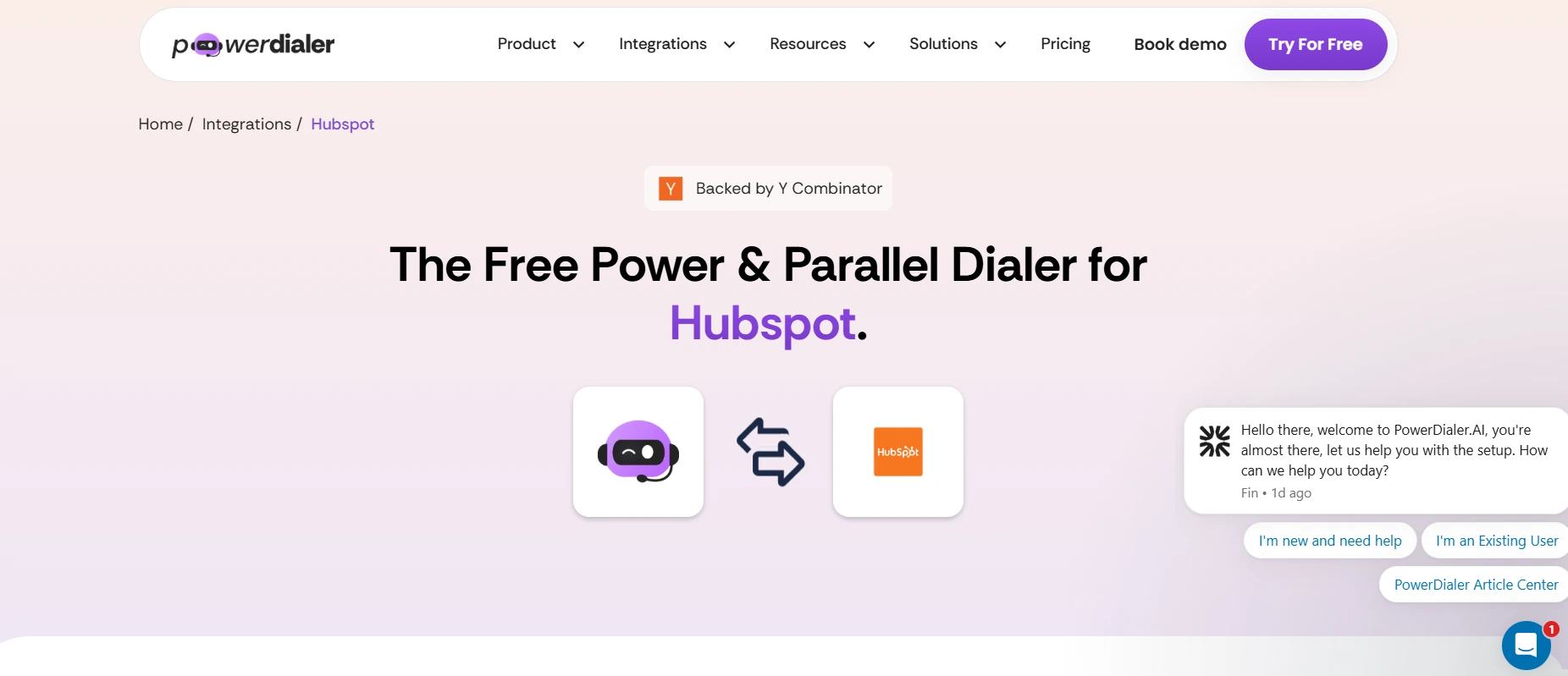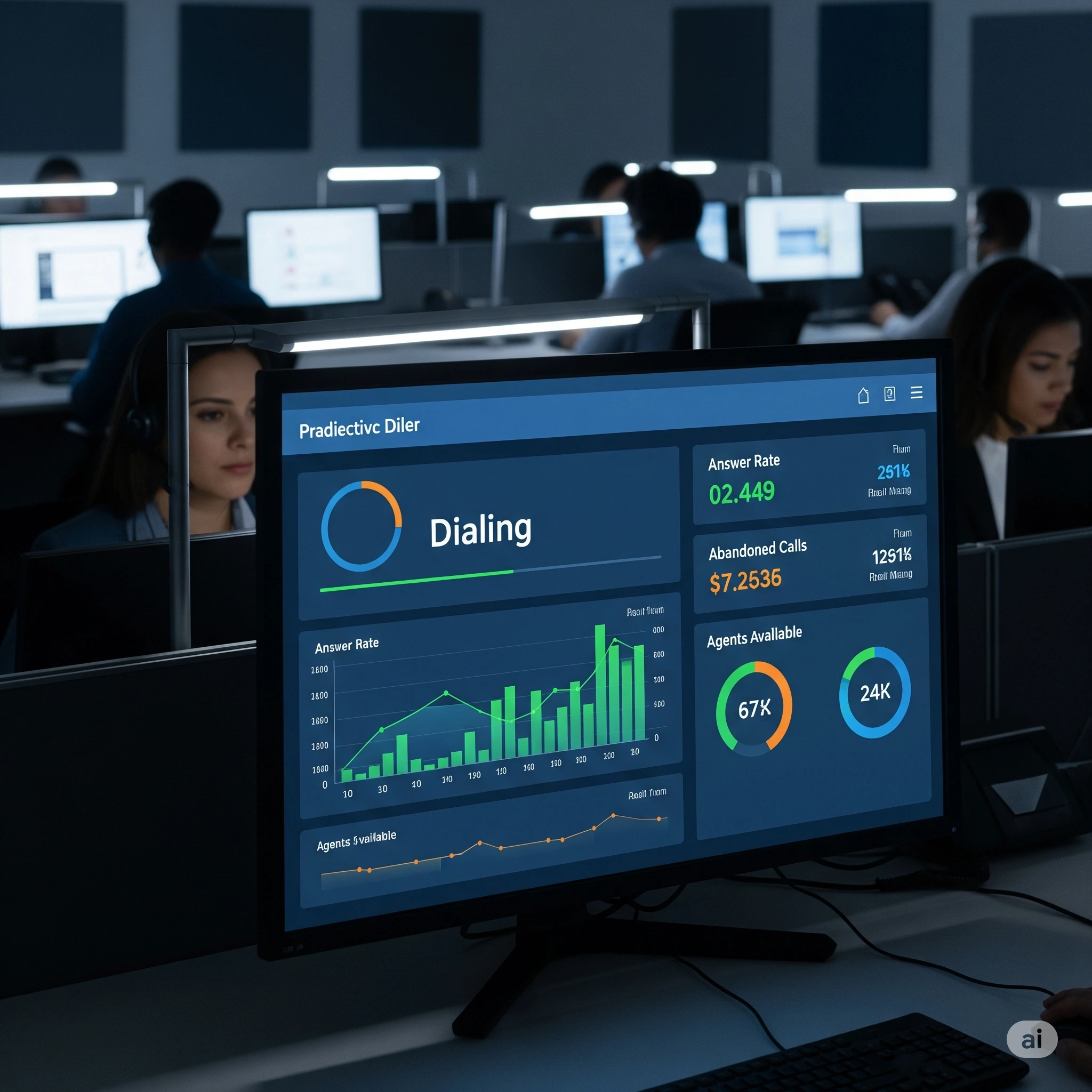
Power Dialer vs Predictive Dialer
Summary:
Understanding the differences between power dialers and predictive dialers is key to boosting your sales team's efficiency. This guide highlights the features and advantages of each, helping you choose the right dialer to enhance productivity and customer engagement.
While both dialers are designed to streamline outbound calling, they serve different purposes. Power dialers give agents more control by dialing one number at a time automatically, ensuring every call gets personal attention. Predictive dialers, on the other hand, use algorithms to dial multiple numbers at once and connect answered calls to available agents, maximizing volume. Understanding when to use each can make the difference between rushed conversations and meaningful customer connections.
.avif)
I’ll be straight with you: when most sales leaders talk about “tools to boost productivity,” they love throwing buzzwords around. But in the trenches, when your reps are under pressure to hit quota, the difference between a decent tool and the right tool is night and day.
A few years ago, I managed a mid-size outbound sales team. The reps were talented, the pipeline was decent, but the biggest frustration wasn’t skills or scripts, it was the dead air between calls. I’d see reps wasting five minutes just waiting, dialing, or updating notes. Multiply that by 10 reps, and suddenly we were bleeding hours every day.
That’s when I started seriously digging into automated dialers. And let me tell you: the debate between power dialers and predictive dialers isn’t just a tech decision, it’s a strategy decision.
If you’ve been wondering which one actually makes sense for your team, this guide will give you the no-fluff breakdown.
What Is a Power Dialer (and Why Reps Secretly Love Them)?

A Power Dialer is like having an assistant sitting beside every rep, lining up calls so they don’t have to. One number at a time, steady pace, no downtime.
Here’s how it usually plays out:
- The rep finishes a call.
- Instead of fumbling with spreadsheets or CRMs, the dialer automatically dials the next contact.
- If it hits voicemail, the rep can drop a pre-recorded message in seconds.
- The rep can glance at the notes before the next conversation.
It’s smooth. It’s simple. And here’s the kicker, it feels natural to the rep. They still control the pace, they still get a moment to prep, and they don’t feel like robots jumping from one random conversation to the next.
Why power dialers shine:
- Consistency without chaos: One call ends, the next begins. No awkward silences or 20 numbers ringing at once.
- Personalization made easy: You can scan LinkedIn or the CRM for 10 seconds before diving in. That tiny prep often makes the difference between “not interested” and “let’s talk.”
- No abandoned calls: Every answered call has a human on the other end. No compliance issues, no annoyed prospects hearing dead air.
- Perfect for B2B: If you’re selling high-ticket SaaS, real estate, or consulting, every single conversation counts.
But let’s be honest, power dialers aren’t perfect. If you’ve got 100,000 leads and only three weeks to reach them, dialing one at a time will feel like watching paint dry.
What Is a Predictive Dialer (and Why Call Centers Swear by Them)?

Predictive dialers are a different beast altogether. They’re built for speed and scale. Instead of dialing one number, they’ll dial five, ten, or more at the same time, then connect whichever one picks up to a rep.
Sounds efficient, right? It is. But it’s also a bit like running a sprint while juggling knives: powerful if you can handle it, risky if you can’t.
Why predictive dialers impress:
- Maximum talk time: No more sitting around waiting. The moment a rep finishes a call, another live one is ready.
- Through-the-roof volume: Perfect if your goal is blasting through massive lists (think: political campaigns, surveys, debt collection).
- Great for B2C: When personalization isn’t critical, speed matters more.
But here’s the downside and it’s a big one: sometimes calls connect with nobody on the line because all reps are busy. Prospects hear silence, get annoyed, and hang up. Too many of these and you’re not just losing deals, you’re flirting with compliance violations.
I once consulted for a fundraising organization using a predictive dialer. Their reps were cranking through thousands of calls a day, but their donor complaints were also piling up. Why? Because of the awkward pause before a human spoke. That tiny delay cost them trust.
Power Dialer vs Predictive Dialer: Side-by-Side
Here’s the real-world breakdown you can actually use:
The Compliance Factor Nobody Talks About
If you’re in the U.S., predictive dialers are under the TCPA (Telephone Consumer Protection Act) and FCC rules. And trust me, fines aren’t fun.
Key rules include:
- Abandoned calls must stay under 3%.
- You need to play a recorded message if no agent is available.
- Do-not-call lists must be respected.
- Consent rules are strict for mobile numbers.
I’ve seen small teams get burned by compliance slip-ups just because they wanted to go “faster.” In industries like healthcare, finance, or insurance, a power dialer isn’t just smart, it’s safer.
How to Choose the Right Dialer for Your Team
When I’m asked, “Which dialer should I pick?” I usually throw the question back: What matters more to you, volume or personalization?
Here’s a quick cheat sheet:
- If you’re B2B: Go with a power dialer. Each call matters, and you want reps to have time to research.
- If you’re B2C with huge lists: Predictive dialer wins. It’s about numbers.
- If you’re in a compliance-heavy industry: Stick with power dialers, don’t risk fines.
- If your reps are new: Start with Power Dialers. Predictive Dialers can overwhelm them.
- If you need flexibility: Look for tools that offer both modes.
Why Hybrid Solutions Are Changing the Game
The old days of choosing one or the other are fading. Modern platforms like PowerDialer.ai let you switch between modes.
I’ll give you an example:
- Your team spends the morning in power dialer mode, working through your top 50 high-value accounts with personalization.
- After lunch, they flip to predictive mode, blasting through a 2,000-lead cold list for pipeline filler.
That flexibility is gold. It means your dialer works the way your sales strategy works, not the other way around.
Lessons Learned From the Field
Over the years, I’ve noticed something: reps hate feeling like robots. When tools make them sound scripted or rushed, they disengage. But when tools actually remove friction, morale goes up.
With power dialers, I’ve seen reps enjoy the balance: no wasted time, but still enough breathing room to be human. With predictive dialers, productivity soars, but burnout can creep in faster.
If you’re a sales leader, the trick isn’t just “buying the faster tool.” It’s about matching the tool to the mindset and goals of your team.
Final Thoughts
Here’s my honest take:
- If your sales motion depends on trust and relationships, go with a power dialer.
- If your motion depends on volume and speed, use a predictive dialer.
- And if you want the ability to shift gears, PowerDialer.ai gives you both.
At the end of the day, tools are only as good as the strategy behind them. But if you can eliminate wasted time, respect compliance, and give reps more live conversations, everyone wins.
Curious how this works in practice? Try PowerDialer.ai and see how it can reshape your team’s productivity.
FAQs
1. Can I use both a power dialer and a predictive dialer in the same campaign?
Yes, many modern platforms (like PowerDialer.ai) let you switch between them.
2. Which one gets better conversion rates?
Power dialers often lead to better conversions in B2B because reps personalize more. Predictive dialers win on sheer volume but may have lower quality per call.
3. Are predictive dialers worth the compliance risk?
If you’re in B2C with massive lists, yes, if you follow the rules carefully. If you’re in regulated industries, stick to power dialers.
4. Do reps prefer power or predictive dialers?
Most reps prefer power dialers because they feel more in control. Predictive dialers can be exhausting, though they do keep talk time high.
5. Is there a cost difference?
Predictive dialers can be pricier due to complexity, but the ROI depends on your goals.
6. How do voicemail drops actually save time?
Instead of spending 30 seconds leaving the same message, reps hit one button and move on. Multiply that by 50 voicemails a day, and it’s hours saved.
